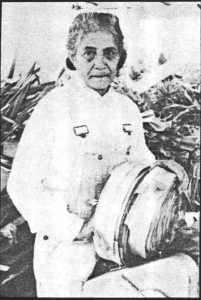Margaret Spinney

A Social History of Kona
This project, a case study of Hawaii's social history, focuses on Kona where people nurtured the development of a community and participated in and witnessed some.of the major historical developments of the islands.
Margaret (Kamaka) Spinney was born on September 26, 1910, in Kalaoa, North Kana, Hawaii. She was the daughter of Jacob Palakiko Kamaka and Kalua Pimoe Makahi, who were lau hala weavers. In 1930, Margaret moved to Kailua, Kana, where she worked as a coffee bean sorter at the American Factors coffee mill. A year later, she married Arthur Spinney, a commercial fisherman. In 1937, they moved to Oahu, where Arthur began working as a parks keeper in Nanakuli. Ten years later, they returned to Kana. Margaret is known for her skills in crocheting, gardening, and lau hala weaving, and she is also active in senior citizens' activities. She learned lau hala weaving from her mother and grandmother, and she had to leave school early to help with the family's lau hala business.
Scope and Content Note:
This interview with Margaret Spinney, conducted by Larry L. Kimura on December 16, 1980, provides a detailed account of her life and experiences. The interview was conducted in Hawaiian and later translated by Larry L. Kimura. The interview covers Margaret's early life in Kalaoa, Kona, including her family's lau hala weaving business and her work as a coffee bean sorter. She discusses the construction of her family's house at the beach, which was built when she was less than a year old. Margaret also shares her experiences learning lau hala weaving from her mother and grandmother, including the tradition of burning the first hat made to gain knowledge on hat making. She talks about the changes in the lau hala weaving industry, including the increase in hat prices and the shift of weavers to hotel work for faster money. The interview also includes Margaret's recollections of her mother's work habits, including her tendency to weave hats from evening to sunrise.
Program Note:
This interview is part of the Center for Oral History's project A Social History of Kona. Interviews from this project are available in the Center's ScholarSpace open access repository.
The Center for Oral History (COH), in the Department of Ethnic Studies at the University of Hawaiʻi at Mānoa, collects, documents, preserves and highlights the recollections of Native Hawaiians and the multi-ethnic people of Hawaiʻi. It produces oral histories and interpretive historical materials about lifeways, key historic events, social movements and Hawaiʻi’s role in the globalizing world, for the widest possible use.
Please Note: The oral histories in this collection are protected by copyright and have been created for educational, research and personal use as described by the Fair Use Doctrine in the U.S. Copyright law. Please reach out Voices@noaa.gov to let us know how these interviews are being used in your research, project, exhibit, etc. The Voices staff can help provide other useful resources related to your inquiry.
The NOAA mission is to understand and predict changes in climate, weather, oceans, and coasts, to share that knowledge and information with others, and to conserve and manage coastal and marine ecosystems and resources. The Voices Oral History Archives offers public access to a wide range of accounts, including historical materials that are products of their particular times, and may contain offensive language or negative stereotypes.
Voices Oral History Archives does not verify the accuracy of materials submitted to us. The opinions expressed in the interviews are those of the interviewee only. The interviews here have been made available to the public only after the interviewer has confirmed that they have obtained consent.
